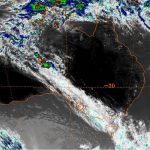 July 29, 2021 10:32 am
Published by Climate Extremes
July 29, 2021 10:32 am
Published by Climate Extremes
Kim Reid offers a useful list of common unspoken knowledge for postgraduate students in the climate sciences. Hopefully, she says, this will save you some time and mistakes in the future.
 October 20, 2020 9:43 am
Published by Climate Extremes
October 20, 2020 9:43 am
Published by Climate Extremes
CLEX researchers explore the challenges of identifying atmospheric rivers and find that detecting these events is highly variable according to resolution, and choice of the integrated water vapour transport thresholds. The uncertainties in a single detection method and data parameters may be as large as uncertainties across AR detection methodologies.
 August 2, 2019 2:27 am
Published by Climate Extremes
August 2, 2019 2:27 am
Published by Climate Extremes
Kim had her first paper accepted in the Journal of Climate and was over the moon but sneaking up behind her was another first she didn't expect - her first bout of imposter syndrome.
 July 20, 2019 2:00 am
Published by Climate Extremes
July 20, 2019 2:00 am
Published by Climate Extremes
In this project, the selected student will develop a numerical algorithm to generate a spatial map of Antarctic ice algal biomass using Machine Learning.
 March 21, 2019 2:30 pm
Published by Climate Extremes
March 21, 2019 2:30 pm
Published by Climate Extremes
New students, an OA for Andy Pitman and some key work on evaporation, the impacts of mesophyll conductance on plant growth, a new algorithm for photosynthesis and future projections of drought made for a strong start to 2019.
 January 14, 2019 11:57 am
Published by Climate Extremes
January 14, 2019 11:57 am
Published by Climate Extremes
Researchers develop a novel algorithm that should enable improved prediction of the function of global ecosystems in a warming climate.
October 17, 2018 3:41 pm
Published by Climate Extremes
Dáithí Stone National Institute of Water and Atmospheric Research, Wellington, New Zealand. Over the past couple of decades a large number of studies have diagnosed the contribution of emissions from human activities to observed climate trends, by confronting process-based expectations with long-term monitoring. Over the same period a much larger number of studies have diagnosed the contribution of observed climate changes to trends in various natural, managed, and human systems. For convenience and following IPCC terminology, we will refer to... View Article






